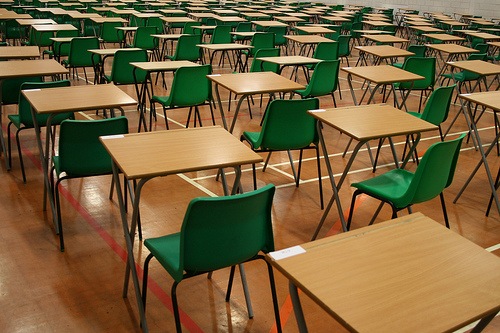
According to the official BCI figures, Nationally 5,665 candidates out of 19,802 candidates who actually sat the exam failed – equivalent to a 71.4 per cent pass rate and 96% attendance. This excludes 1,653 Chennai AIBE candidates who are due to retake the exam at an unspecified future date after yesterday’s scheduled Tamil Nadu exams were again cancelled.
Excepting Chennai, a total of 834 graduates who had enrolled and paid the Rs 1,300 fee did not eventually appear for the exam, according to the BCI’s official figures.
This means that 6,499 graduates will have to re-take the exam and will not be allowed to practice until they clear the exam, according to the affidavit that some bar councils required graduates to sign, which first reared its head in November.
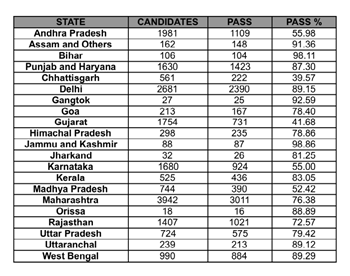
Maharashtra was the biggest pool of candidates with 3,942, of whom 76 per cent passed. The second-largest pool Delhi, by contrast, performed the best in its tier by size as 89 per cent of candidates passed.
States with smaller numbers of candidates generally fared best, such as Jammu and Kashmir (87 out of 88 candidates passed), Bihar (104 out of 106) and Orissa (16 out of 18) – percentages between 99% and 88%.
By far the worst performing states were Chhattisgarh (only 40% out of 561 passed), Gujarat (42% out of 1,754), Madhya Pradesh (only 52% out of 744), Karnataka (55% out of 1,680) and Andhra Pradesh (56% out of 1,981)
A question of tongue
English was by far the most popular exam language with 12,803 takers and pass rates 10 percentage points above the average, at 82% (see table right).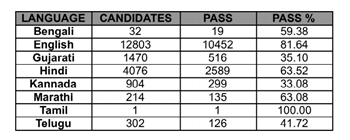
Kannada, which 904 candidates opted for, saw a pass rate of only 33 per cent, while only 35% of 1,470 Gujarati language candidates managed to pass.
The second-biggest language after English was Hindi with 4,076 candidates and a below-average pass-rate of 64% – similar to Marathi, which only 214 candidates opted for, and Telugu with 302 candidates, of whom 59% failed.
Gender differences
Only 6,683 women registered to take the bar exam compared to almost twice as many men: 13,146. The pass percentage for women was marginally higher at 72.1% compared to male candidates (71.1%).
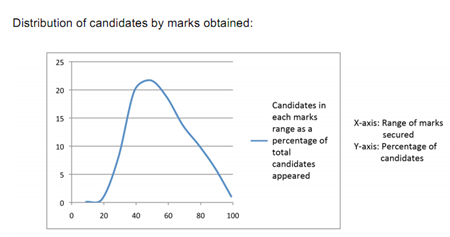
The marks were distributed in a rough bell curve hitting a median peak around 50 marks out of 100, which is only 10 points more than the pass mark of 40.
From the graph, approximately half of all candidates scraped by with between 40 and 50 points.
On the graph roughly 1 per cent of candidates, equivalent to around 200 graduates, appear to have scored very near to or at the 100 per cent mark, although the graph is not entirely clear on that front.
The lowest scores appear to have been between 10 and 20 marks out of 100.
The three top-scoring candidates are eligible for prizes although BCI chairman Gopal Subramanium admitted the possibility that more than three could be tied for the top spots with allowances then having to be made.
The key to the puzzle
The BCI has also revealed the model answer key to the exam (click table on the right for full key). Question – 80 had no correct 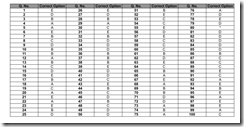
Bar exam preparation service BarHacker had provided unofficial model answers on 12 March, three of which had different responses from the official BCI model answers. [Full disclosure: Legally India has a commercial interest in BarHacker]
By way of illustration of apparently the most tricky questions, the questions and the correct responses as well as BarHacker’s (now officially erroneous) responses are indicated below.
Question 21. A held an office under a state government. A was not entitled to receive any salary or compensation under the terms of office, but was entitled to claim reimbursement of expenses incurred in the course of discharge of A’s duties. The terms of office provided a limit on the expenses that could be incurred, and that would be reimbursed. Later, A stands for election to the state legislature, and is elected. A member of the opposing party challenges A’s membership in the state legislature on the ground that A holds an office of profit under the government. Which of the following is most accurate in this case?
Principle: Article 102 of the Constitution provides that any person who holds an office of profit under the Government of India or the government of any state is disqualified from being chose as, and for being, a member of either House of Parliament.
Options:
B. The challenge will fail, since A is not entitled to any salary or compensation under the terms of office. As such, it cannot be said that A held an “office of profit” under the state government. [BarHacker’s model answer]
E. None of the above. [The BCI’s answer key model answer]
Question 29. If a person is intoxicated against his will and commits a crime when he is incapable of knowing the nature of his actions, then he will be:
Options
A. Punishable because being intoxicated is also an offence. [The BCI’s answer key]
E. Not punishable under the Indian Penal Code, 1860. [BarHacker’s unofficial model answer]
Question 80. ABC Private Limited has ten shareholders who hold 1,000 equity shares each. ABC Private Limited calls a shareholders’ meeting on January 1, 2011 with requisite notice. Only six shareholders attend the meeting. A motion is put to vote to change the name of the company. Four shareholders vote for the resolution and two shareholders vote against the resolution. Which of the following statements most accurately applies the principle set out below to the fact situation above?
Principle: A special resolution requires the approval of at least three-fourth majority of the shareholders present and voting at a shareholders’ meeting. Matters that must be approved by way of special resolution include amendment to the Articles of Memorandum of Association [sic] of a company, change in name of the company, and to shift the registered office of the company from one state to another.
Options:
A. The resolution is not passed as at least five members, that is, fifty per cent of the shareholders should have voted for it.
B. The resolution is passed as an ordinary resolution as at least three-fourth majority is required for a special resolution. [This was the answer given as the most accurate one by BarHacker]
C. The resolution is passed as a special resolution since at least three-fourth majority voted for the resolution.
D. The meeting was invalidly held since all the shareholders did not attend.
E. The resolution is not passed as it was not unanimously passed.
[Note: The BCI awarded full marks to all candidates in this question due to there being no correct answer]
Question 94. D, a national of Country A, is wanted by the authorities of Country B on charges of having been involved in terrorist attacks in Country B. He is seized by Country B’s special forces from his hideout in Country C. The authorities of Country C were not contacted for consent. The correct legal position in international law would be:
Principle: For certain grave crimes, a State is allowed to exercise universal jurisdiction.
Options:
A. It is a violation of Country C’s territorial sovereignty. [BarHacker’s model answer response because “only the principle is mentioned in the material, not the correct position in international law”]
B. It is not a violation of Country C’s territorial sovereignty owing to the gravity of the crime, which allows for universal jurisdiction. [BCI’s model response]
Download the full BCI model answers and statistics here.
Photo by comedynose
threads most popular
thread most upvoted
comment newest
first oldest
first
Before anyone goes all keyboard warrior on me, let me clarify that the caste favouritism isn't with reference to the students, but the faculty employed in law colleges.
When spots meant for qualified faculty are subverted to induct inexperienced, inept, incapable faculty solely because they belong to a certain caste, the standards of legal education take nose-dive.
Now passouts of AIBE , let this be your first practical assignment.
threads most popular
thread most upvoted
comment newest
first oldest
first